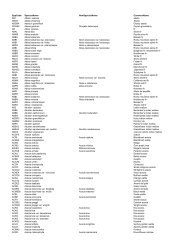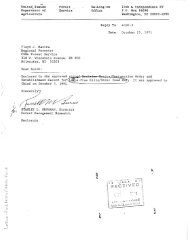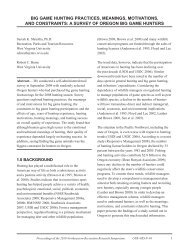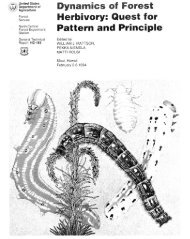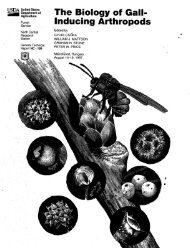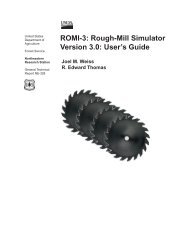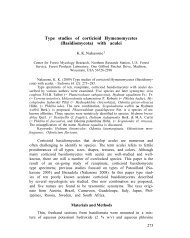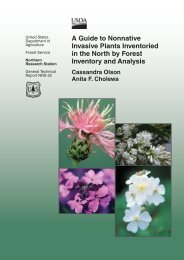Proceedings of the 2009 northeastern recreation research symposium
Proceedings of the 2009 northeastern recreation research symposium
Proceedings of the 2009 northeastern recreation research symposium
Create successful ePaper yourself
Turn your PDF publications into a flip-book with our unique Google optimized e-Paper software.
EXPLORING ELEMENTS THAT INFLUENCE STEWARDSHIP<br />
IN THE EASTERN LAKE ONTARIO DUNE AND WETLAND AREA<br />
Diane Kuehn<br />
State University <strong>of</strong> New York<br />
College <strong>of</strong> Environmental Science and Forestry<br />
dmkuehn@esf.edu<br />
James Smahol<br />
State University <strong>of</strong> New York<br />
Abstract.—Th e Eastern Lake Ontario Dune and<br />
Wetland Area (ELODWA) is a 17-mile stretch <strong>of</strong><br />
sand dunes, wetlands, and woodlands along <strong>the</strong><br />
eastern shore <strong>of</strong> Lake Ontario in New York State.<br />
Reductions in negative, visitor-caused impacts on <strong>the</strong><br />
dunes (e.g., trampling <strong>of</strong> dune vegetation and sand<br />
erosion) are thought to be due in part to <strong>the</strong> extensive<br />
visitor education eff orts <strong>of</strong> government agencies and<br />
non-governmental organizations. Th is study seeks to<br />
identify <strong>the</strong> elements infl uencing <strong>the</strong> development <strong>of</strong> a<br />
stewardship ethic in ELODWA users via 60 in-person<br />
qualitative interviews. Interview data revealed that both<br />
on-site management actions and socialized elements<br />
(e.g., upbringing) infl uenced <strong>the</strong> stewardship actions <strong>of</strong><br />
visitors. Recommendations based on <strong>the</strong> analysis include<br />
diversifying on-site management and communicating a<br />
consistent stewardship message over time.<br />
1.0 INTRODUCTION<br />
Many <strong>research</strong>ers have studied <strong>the</strong> infl uence <strong>of</strong><br />
educational eff orts on managing visitor behaviors in<br />
natural settings over <strong>the</strong> past 25 years (McAvoy and<br />
Dustin 1983, Vander Stoep and Gramann 1987,<br />
Duncan and Martin 2002, Kuehn and Th ompson<br />
2007). Th e Eastern Lake Ontario Dune and Wetland<br />
Area (ELODWA) is a 17-mile stretch <strong>of</strong> sand dunes,<br />
wetlands, and woodlands located in north-central New<br />
York State. At <strong>the</strong> ELODWA, extensive visitor education<br />
eff orts by government agencies and non-governmental<br />
organizations in <strong>the</strong> area may be partially responsible<br />
for reductions in negative, visitor-caused impacts on<br />
<strong>the</strong> dunes (e.g., trampling <strong>of</strong> dune vegetation and sand<br />
erosion) (Kuehn and Habig 2005, Kuehn and Th ompson<br />
2007). Th e strong stewardship ethic <strong>of</strong> many ELODWA<br />
visitors and local residents is <strong>of</strong> interest to agencies and<br />
organizations like <strong>the</strong> New York State Department <strong>of</strong><br />
Environmental Conservation, New York State Offi ce<br />
<strong>of</strong> Parks, Recreation and Historic Preservation, New<br />
York Sea Grant, and Th e Nature Conservancy. Natural<br />
resource stewardship, defi ned as “making conscious<br />
decisions to act responsibly towards our environment”<br />
(Fisheries and Oceans Canada <strong>2009</strong>), may play an<br />
important role in encouraging protective behaviors by<br />
resource users during <strong>the</strong>ir visits to natural areas. If<br />
understood, <strong>the</strong> elements infl uencing <strong>the</strong> development<br />
<strong>of</strong> this stewardship ethic in ELODWA users could be<br />
used to foster similar stewardship values in users <strong>of</strong> o<strong>the</strong>r<br />
natural areas.<br />
While a stewardship ethic has an important role in<br />
visitors’ careful use <strong>of</strong> natural resources, <strong>the</strong> existing<br />
knowledge base about what infl uences <strong>the</strong> development<br />
<strong>of</strong> stewardship values and behaviors in users is extremely<br />
limited. Th e purpose <strong>of</strong> this study is to identify<br />
management strategies that encourage ELODWA users’<br />
stewardship <strong>of</strong> natural resources. To accomplish this<br />
goal, we conducted 60 interviews during <strong>the</strong> summer <strong>of</strong><br />
2008 to identify stewardship-related actions, <strong>the</strong> factors<br />
infl uencing stewardship in both resident and nonresident<br />
male and female ELODWA users, and whe<strong>the</strong>r a<br />
stewardship ethic develops immediately or over time. Th e<br />
results and management implications <strong>of</strong> this study are<br />
discussed below.<br />
2.0 METHODS<br />
We conducted 60 in-person interviews with local<br />
residents and nonresidents in <strong>the</strong> ELODWA during<br />
summer 2008. We established a stratifi ed random<br />
sampling framework to sample visitors by location (fi ve<br />
areas providing public access within <strong>the</strong> ELODWA),<br />
day <strong>of</strong> week, time <strong>of</strong> day (morning, early afternoon, late<br />
afternoon), gender, perceived age (i.e., 18-40, 41-60,<br />
61+ years), and proximity <strong>of</strong> residence to ELODWA area<br />
(residents were defi ned as those living within 20 miles<br />
<strong>of</strong> <strong>the</strong> ELODWA, while nonresidents were defi ned as<br />
those living 21 miles or more away). We developed a<br />
stratifi ed sampling framework for randomly chosen days<br />
<strong>Proceedings</strong> <strong>of</strong> <strong>the</strong> <strong>2009</strong> Nor<strong>the</strong>astern Recreation Research Symposium GTR-NRS-P-66<br />
112




